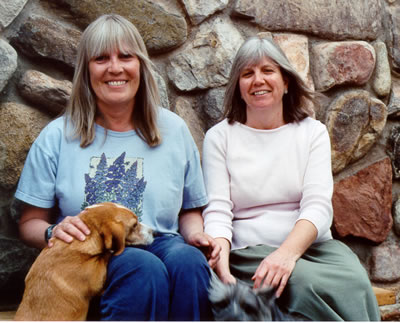| For
every victim of calamity, there are a number of others traumatized
by the event. Almost invariably, the victims receive fast,
effective and professional care by emergency services personnel.
The latter are often left to fend for them selves.
This was the realization
of the first group of people who formed what is now a national
organization of Trauma Intervention Programs, Inc.
(TIP). The first Utah Chapter was trained in Moab
over the past fall and winter, and is now prepared to step
in and help family members, witnesses and bystanders who need
help and/or support in the unfortunate but inevitable event
of accident and injury during the upcoming tourist season.
Leading Moab’s group
of 11 trained TIP professionals are Kris Hurlburt, program
manager, and Patrice Mott, the group’s media representative.
Pat Wucherer is the assistant program manager.
| 
Kris Hurlburt and Patrice Mott
|
Kris brings to the group
a background as a Red Cross volunteer who, with a Master’s
degree in psychology, assisted victims of war and natural
disaster for 10 years. She knows first hand the premise of
“emotional first aid” that the TIP program is
based on, and after using these skills abroad, is anxious
to bring them to fruition in her own community.
“Pain is pain,” Kris says matter-of-factly. “This
is such a practical, common-sense program and really helps
people. It’s painful and traumatic for those who witness
a tragedy and we can help with practical arrangements such
as places to stay, making phone calls – just making
sure families and friends are safe until somebody can come
for them or they can get home.”
Kris uses the example of a visitor to Moab whose family has
been in an accident. One person or more may be hospitalized,
others are okay, physically. The ambulance, police and firefighters
have left the scene. A TIP volunteer can be of invaluable
assistance at that point.
“With so many visitors here, they may not know where
to go for help,” Patrice adds. “This is a small
community, very isolated and we have tons of tourists.”
TIP volunteers have to be invited to a scene, and Kris and
Patrice have done some footwork to establish relationships
with local emergency service providers so that their very
specialized services may be used as well. It is an all-volunteer
organization, but volunteers receive 55 hours of initial training
in such things as emotional first aid, confidentiality, working
with myriad agencies and how to respect the needs of others
while offering assistance. Volunteers then commit to three
additional hours of training every month to maintain their
certification and are on call for three, 72-hour shifts per
month.
“It’s very intensive training,” Kris said.
“Just about everybody has been affected by something
that has happened either to them or around them, and this
training brings a lot of this stuff up.”
Volunteers are also scrutinized by the larger organization
before they can be certified. Each volunteer goes through
a background check and must have a driving record free of
reckless driving or drug or alcohol-related incidences. There
are guidelines and bylaw, policies and procedures all volunteers
must observe, though some vary from chapter to chapter depending
on local needs.
The original, and largest TIP Chapter is located in San Diego,
where TIP was founded. “The needs of San Diego are obviously
going to be a little different from ours,” Kris notes.
TIP is also a very inexpensive program to run. Moab’s
Chapter operates on about $10,000 a year. Volunteers provide
their own pagers and transportation, while the parent group
provides liability insurance and training. The money is raised
through fundraisers and donations.
Moab TIP will offer two training sessions a year, the next
one planned for mid-summer. The group will also be assembling
a board of directors this year, whose members can help bring
different perspectives and expertise in the services provided.
For more information about upcoming trainings, board membership
or other ways to contribute to the early development of the
local TIP Chapter, contact Kris at 259-1135, or Pat at 259-4783. |
